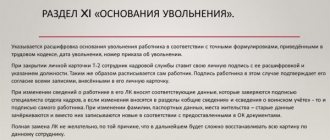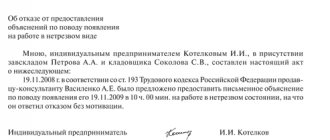In connection with current realities, the topic of violation of employee rights and illegal dismissals is increasingly being taken into account. It is worth first understanding the very concept of illegal dismissal.
Unlawful dismissal of an employee will be the termination of an employment contract by the employer without legal grounds. These types of dismissal include grounds that are not provided for by the Labor Code of the Russian Federation or based on false arguments of the employer, as well as dismissal with non-compliance with the procedure established by law.
You can legally terminate a contract on the following grounds:
- by agreement of the parties;
- upon expiration of the validity period (for concluded contracts for a certain period);
- at the employee’s own request;
- at the initiative of the employer;
- in connection with a transfer to another job;
- due to circumstances that do not depend on the will of the parties to the contract.
But the Labor Code of the Russian Federation does not have the concept of “illegal dismissal” as such, although it may exist if the court found the dismissal to have been committed in violation of legal norms.
How to understand that dismissal is illegal
- The employer dismissed the employee for violation of discipline without first imposing milder disciplinary sanctions, which could be a warning or reprimand.
- A dismissed employee is related to preferential categories of citizens. Such employees can be dismissed only on the basis of liquidation of the company or due to the expiration of a fixed-term employment contract with the absence of other vacancies for this citizen.
- The employer forced the employee to write a letter of resignation through deceptive methods or other measures when the employee did not have the desire to resign on his own.
- The reason for dismissal is not described in the Labor Code of the Russian Federation or other legislative acts;
- The employee was dismissed while he was on sick leave (however, such dismissal is legal during the liquidation of the company).
- The employer did not comply with the legal requirements for the dismissal procedure.
Procedural shortcomings allowed by the employer upon dismissal

Regarding the procedure for dismissal on their own initiative and the preparation of related documentation, employers most often make the following mistakes:
- Dismissal after verbal expression of desire. The law establishes a requirement to draw up a statement of termination of a contract on one’s own initiative in writing. If the management of the enterprise fails to present the original or a copy of the statement confirming the will of the citizen in a lawsuit, the judge will side with the employee and reinstate him in his position. An example of such a position is the determination of the Supreme Court of the Republic of Karelia dated January 10, 2014 No. 33-211/2014.
- Dismissal based on an application that does not indicate the date of resignation. An analysis of judicial practice shows that if the contract is terminated later than two weeks on an application that does not indicate the day of resignation, the court will side with the employee.
- Dismissal of an employee not on the day specified in the application. The legislation makes it possible to implement the procedure for abdication of powers before the expiration of the two-week warning period, by agreement of the parties. Also, the management of the enterprise is obliged to dismiss the citizen on the date specified by him in the presence of circumstances regulated by law, such as retirement. If the procedure is not implemented on time, the court will declare the dismissal unlawful.
- Refusal of the company's management to dismiss on a date specified by the employee, if the application was submitted in connection with the employer's violation of the terms of the employment contract.
- Violation of the provisions of the law on the right to withdraw an application before the expiration of a two-week warning period. The court will evaluate the circumstances surrounding the dismissal, since the recall procedure itself is not regulated by the Labor Code of the Russian Federation.
Judicial practice shows that employers quite often make shortcomings precisely in the implementation of the dismissal procedure on their own initiative. This basis is one of the most common reasons for termination of a contract, and personnel department employees need to pay more attention to the procedural component in order to avoid unpleasant consequences.
What to do in case of illegal dismissal from work
The only possible solution to this situation is to go to court. The legislation provides specific periods from the date of illegal dismissal during which an employee can go to court.
This must be done in the first month from the moment of receiving a copy of the order or work record book or refusal to receive them. If you go to court after a month, the authority will refuse to consider the case. An exception in such situations may be cases of illness during this period of time.
You need to contact the district court. The employee is exempt from paying state duty. It is worth noting that neither the labor inspectorate (if you are not a member of a trade union) nor the prosecutor’s office will be able to consider the employee’s case. An administrative or criminal case can be initiated against an employer only on the basis of a court decision that has declared the company’s actions illegal.
Review of the judicial practice of the Supreme Court from 09.12.2020
A new document on old pressing issues was approved on December 9 of this year by the Supreme Court of the Russian Federation - we will talk about dismissal, i.e., termination of an employment contract by the employer (also RD). In most cases, the employee is the weaker party to the employment contract (hereinafter also referred to as TD). And, in theory, it should be more protected by law. Alas, in practice this is not always the case, which is what the RF Armed Forces drew attention to. Let us give a brief overview of the positions formed on the basis of a review of practice by the main court of the country.
Since the review turned out to be quite voluminous, our material will be divided into three parts. We bring to your attention the first one.
If the court found the dismissal illegal
If the court recognizes the fact of illegal dismissal from work, the body may oblige the employer:
- Reinstate the employee in his original position.
- Pay the employee the average monthly salary for the entire period of forced absence due to illegal dismissal from the period of dismissal until the day of reinstatement or a court decision.
- Correct the entry in the work book to indicate “dismissal of one’s own free will” if the employee does not plan to continue working for this employer.
- Pay compensation for moral damage.
- Pay the employee court costs, as well as the costs of legal services of a representative in court.
The employee has the right to move and work at another job even while the case is being considered by the court. In this case, wages for forced absence due to illegal dismissal will still be recovered from the employer. That is, it is not at all necessary to be reinstated at your previous place of work. And an inappropriate entry in the work book can be legally replaced with “dismissal at will.”
Procedure for challenging dismissal

You can learn how to act if the management of an enterprise illegally fired someone at their own request from Chapter 60 of the Labor Code of the Russian Federation. Only a court can force an employer to restore the violated rights of an employee. According to Article 381, parties to a dispute in the field of labor relations can be both current employees and former employees who previously had mutual obligations with the employer. Thus, it is possible to initiate legal proceedings to protect violated rights after dismissal. This article also gives the management of the enterprise the opportunity to contact the appropriate authority in order to bring a former employee to justice in the event of illegal actions discovered or committed by him. The same norm of the Labor Code provides for a judicial procedure for resolving disputes that arise between participants in legal relations.
What does an organization face for illegally dismissing an employee?
For illegal dismissal, administrative and, in some cases, criminal penalties may be applied to the employer.
- Administrative liability is expressed in the form of payment to the state of a fine in the amount of 1,000 to 5,000 rubles from the guilty official or a fine from a legal entity in the amount of 30,000 to 50,000 rubles, as well as a fine from an individual entrepreneur in the amount of 1,000 to 5,000 rubles. 5,000 rubles.
- Criminal liability occurs in cases of illegal dismissal of privileged categories of citizens, for example, single mothers who are raising a child under 3 years of age. In this case, Art. 145 of the Criminal Code of the Russian Federation and punishment in the form of a fine in the amount of up to 200,000 rubles, or in the amount of wages or other income of the convicted person for a period of up to 18 months, or by compulsory work for a period of up to three hundred and sixty hours.
The state labor inspectorate is responsible for bringing the employer to administrative liability, which must be contacted after the court makes a decision on actual illegal dismissal.
If you want to challenge illegal dismissal from work, then you first need to make sure that the employer violated the norms of the Labor Code of the Russian Federation, sue the employer with a subsequent ruling in your favor and initiate enforcement proceedings. If necessary, you can always get advice or legal assistance by contacting RosCo specialists.
Differences between self-will and coercion

Forcing an employee to leave at his own request by the management of an enterprise must be distinguished from making an independent decision to resign due to certain reasons. Confusion in these concepts has more than once led to the reinstatement of a person who resigned in the absence of legal grounds. If an employee committed a disciplinary offense, for example, did not show up for work without good reason or became intoxicated during the working day, the employer’s intention to apply disciplinary measures against him within the framework of the law cannot be regarded as forced dismissal.
So, if the management of the enterprise demanded from the employee a written explanation of the reasons for his disciplinary offense, and in response to this he submitted a letter of resignation, such an action should be considered as an independently made decision to terminate the contract, and not coercion. If, after resigning, the employee challenges the procedure, the court must objectively assess the circumstances.
If the management of the enterprise really puts pressure on the employee, for example, threatens to fire him “under the article”, which may negatively affect his business reputation, but he did not commit a disciplinary offense, such termination of the contract will be considered illegal. However, the citizen will need to file a complaint and prove the fact of coercion. To do this he can use:
- Documentation.
- Witness's testimonies. Other employees are not often willing to testify against the management of the enterprise where they will continue to work. However, in the case of mass illegal dismissals, this method of proof is extremely effective.
- Business correspondence.
- Audio and video recordings.
- Other evidence within the framework of current legislation.
According to the Code of Civil Procedure of the Russian Federation, all evidence must be obtained legally.
Closing a branch
A closing branch entails the need to terminate labor relations with its staff. The Supreme Court of the Russian Federation looked into it and came to the conclusion that closing a branch (representative office) is the same as liquidating an organization. For the purpose, of course, of terminating the TD.
The courts of first and appellate instances were unable to find the correct solution to the following situation. The organization closed a branch located in another region. The citizen was offered a transfer to another region, but she did not respond, as a result of which she was fired. The first instance remained on the side of the employee, the second on the side of the employer.
The Supreme Court noted that the place of work (including in the branch) is a mandatory condition for the TD. The termination of the work of a branch located in another area is carried out according to the rules of liquidation. Therefore, it was impossible to fire an employee for refusing a new position when the branch was closed.
Disciplinary offense

Behavioral troubles also happen in labor relations. One of the grounds for dismissal is violation of discipline. When dismissing someone for disciplinary reasons, the employer is obliged not only to provide evidence of misconduct, but also to take into account previous merits.
The school employee received a reprimand, which was followed by dismissal. Prior to this, the teacher was absent from the workplace once and also violated the work schedule. Having collected this “bouquet”, the school management fired the teacher. The citizen considered that the directorate did not take into account the severity of the offense and the conscientiousness of the performance of duties. The lower courts rejected her claim for reinstatement, considering that the penalties imposed by the RD on the employee were lawful. But, again, the Supreme Court did not agree with this.
The board noted that the school should have taken into account the circumstances of the offense and its severity. The Supreme Court of the Russian Federation already spoke about this in 2004. However, the courts did not take these clarifications into account and were “punished” by cancellations. This, by the way, is another coin in the treasury of transferring the positions of higher courts into the category of precedent. But that's a slightly different story.
Meanwhile, the dismissed teacher had the highest category, titles, commendations and many other achievements. Over the 30 years of her work, she was never held accountable until disagreements with the administration arose.
Branch staff reduction
When downsizing a branch, the employer is obliged to offer all available open positions. Vacant positions must be suitable for the person being fired.
The situation is as follows - the unit has been reduced, the employee has been fired under clause 2 of part 1 of Art. 81 Labor Code of the Russian Federation. The citizen was not offered a place in the “base” - he went to court for reinstatement. The first and second instances refused, but the Supreme Court looked at the case differently.
The Supreme Court found that the dismissal of the employee was still illegal. In overturning the judicial decisions, the board indicated that dismissal is permissible only if it is impossible to transfer to another vacant job. Both the branch and the main division were located in Moscow, therefore, the employer had to offer work in the central office. But this was not done.
Without authority
The employee performed work as the general director of the company. On the last working day, they did not make a final payment to him and did not issue a dismissal order. The district court's decision satisfied the plaintiff's claims. In the appeal, the defendant asks to cancel the court's decision, citing the absence of the need to issue an order to dismiss the general director, since there was a decision of the sole founder. But the appeal rejected this argument, pointing out that it was based on the defendant’s incorrect interpretation of labor legislation (appeal ruling of the St. Petersburg City Court dated October 10, 2021 No. 33-21532/2017 in case No. 2-2827/2017).
Late payment
The employee indicated that he worked for the company, while the defendant did not pay wages on time and upon dismissal did not make a final payment to him. The court of first instance supported the employee and satisfied his demands, to which the defendant filed an appeal, which was rejected. Satisfying the claims, the court came to the conclusion that the defendant did not pay wages on time and they did not provide evidence of payment to the plaintiff in full upon dismissal and repayment of debt (appeal ruling of the Moscow City Court dated October 12, 2021 in case No. 33-41545/2017) .
Help for the bank
The employee stated that his salary was increased, but in fact it was paid in a smaller amount, and then the company completely stopped transferring funds to the employee’s account. The employee submitted a certificate of income to receive a loan, which the employer issued for him to submit to the bank. The courts indicated that for the disputed period, the plaintiff’s salary was calculated by the defendant correctly based on the time worked and the salary for the position in accordance with the employment contract. The plaintiff’s wage conditions did not change (appeal ruling of the Moscow City Court dated June 28, 2021 in case No. 33-8284/2017).










